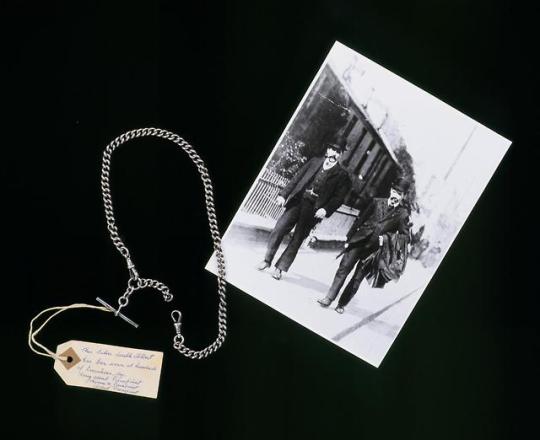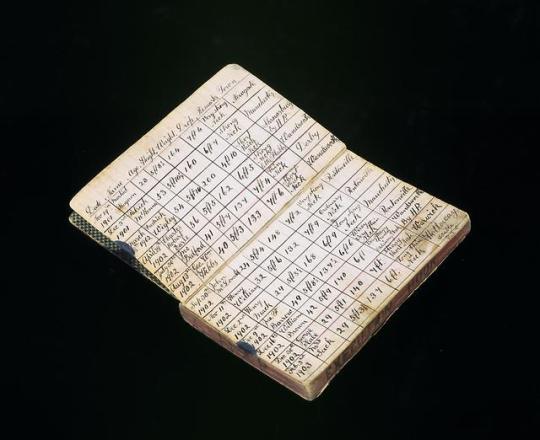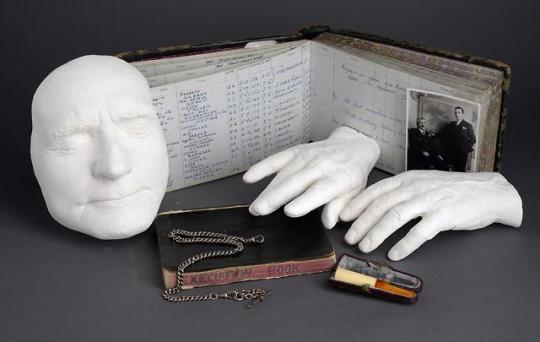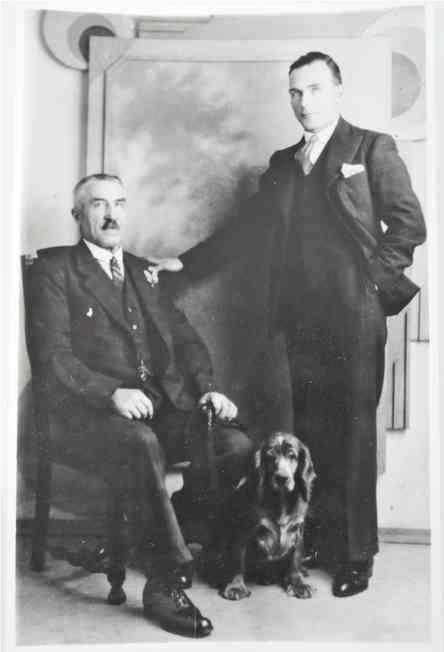#albertpierrepoint
Photo






Unique opportunity to buy a piece of social history:
the personal archive of the most famous British hangman
Albert Pierrepoint comes up for auction
A recent documentary about Ruth Ellis brought Albert Pierrepoint (30 March 1905– 10 July 1992), Britain's most famous hangman back into public view. He became famous when the press discovered that he was the hangman for some of the Nazi war criminals and once he resigned from his part time job as executioner, he often commented on changes in the law and famous executions like for example the Ruth Ellis case. She was the last woman he executed and the last woman to be executed in the UK before the law changed.
The collection includes his note book, listing the executions with important details to determine how to achieve the quickest death for the almost 500 criminals listed, but also his father Henry's notebook. The plaster cast of Pierrepoint's face and hands, some photographs, his watch chain and cigarette holder are also included and the lot is expected to sell for £25,000 – 40,000 in Summers Place Auctions' Anniversary Auction on Tuesday, 12th June 2018.
Pierrepoint almost inherited the job of executioner, as both his father and uncle (with his uncle Thomas below) had also been executioners. He decided as a young boy that he wanted to follow into their footsteps. He worked in a grocery shop and did deliveries near Bradford, but qualified as an Assistant Executioner in 1932 and a Chief Executioner in 1941. As an assistant executioner he earned 1½ guineas (about £100 when adjusted for inflation) per execution, with another 1½ guineas paid two weeks later, if his conduct and behaviour were satisfactory. Executioners and their assistants were required to be extremely discreet and to conduct themselves in a respectable manner, especially avoiding contact with the press. He resigned in 1956 and the Home Office acknowledged Pierrepoint as the most efficient executioner in British history and believed him to have
hanged more criminals than anyone else in Britain.

He was the executioner for William Joyce ("Lord Haw-Haw" the Nazi propaganda broadcaster) and John Amery, the first person to plead guilty to treason in an English court since Summerset Fox in May 1654. After the Second World War, he executed some 200 war criminals between 1945-49 in Hameln, Germany (near Bergen-Belsen) and Graz, Austria (near Liebenau). While war criminals at the Nuremberg trials had US executioners, it was agreed that Pierrepoint would conduct the executions in Hameln. He was appointed
an honorary lieutenant-colonel for the purpose and on 11 December 1945 he flew to Germany for the first time to execute the first 11. The press discovered his identity and he became a celebrity, hailed as a sort of war hero. Among those executed were the camp commandant, 'the Beast of Belsen', Josef Kramer; Irma Grese, at 22 the youngest concentration camp guard to be executed for crimes at Bergen and Auschwitz; and Dr Bruno Tesch, co-inventor of the insecticide Zyklon B used in the Holocaust.
In England, Pierrepoint hanged Timonthy Evans for a crime committed by his neighbour John Christie, who was also hanged by Pierrepoint in 1953, three years after Evans. This wrongful execution is acknowledged as a major miscarriage of justice and was a contributing factor for the suspension of the death penalty in Britain in 1965 and its eventual abolition. Other execution included Gordon Cummins, the "Blackout Ripper" and John George Haigh, the "Acid-bath murderer". Pierrepoint also dispatched Derek Bentley for his part in the “let him have it” murder of a policeman, which also had many people
calling for the abolishing of the death sentence.
His first execution as principal hangman was in 1941 – it was the gangland murderer andnightclub owner Antonio "Babe" Mancini who apparently said "Cheerio!" before the trapdoor was sprung at Pentonville Prison. He also executed the last person in the Republic of Ireland, Michael Manning, in 1954. Although there is a film that suggests he was the last hangman in Britain, that is indeed untrue as he resigned eight years before the last execution.
Pierrepoint always said that the key to a quick and as clean as possible execution was the 'drop' a careful calculation of the person's height, weight, age, gender and build to allow for a quick death. In Ruth Ellis's case the drop was 8 feet, 2 inches.


The vendor is selling this exceptional collection of crime memorabilia as he is downsizing and moving abroad, but is still fascinated by it's importance as a witness of social and legal history. He originally bought it to research some of the stories behind those executed by Pierrepoint and believes that it would ideally be purchased by a museum, which would enable many more people to analyse these historic documents in their wider social and legal circumstances.
Pierrepoint's wife didn't know for years what her husband's part time job was, although he finally told her when he returned from a job abroad. The boost of income provided by the German executions allowed him to leave the day job and they became pub owners, first in Hollinwood, Greater Manchester and later near Preston, Lancashire before retiring to Southport. His autobiography was published in 1974, it was the first time he had made his views on capital punishment public - a decade after its abolition. He allegedly became an
opponent of capital punishment. In 1950 he had to hang a slight acquaintance, a regular in his pub, who had been there on the night when he murdered his girlfriend in a fit of jealousy. It made Pierrepoint feel that hanging was no deterrent, particularly when most of the people he was executing had killed in the heat of the moment rather than with premeditation or in furtherance of a robbery. In his autobiography Executioner:
Pierrepoint , he wrote: “It is said to be a deterrent. I cannot agree. There have been murders since the beginning of time, and we shall go on looking for deterrents until the end of time. If death were a deterrent, I might be expected to know.” He did however believe until the end that "our method was the cleanest, quickest and most humane in the world.”
For further information on the auction, please visit
www.summersplaceauctions.com or call 01403 331331.
For press information or images please contact Silke Lohmann
([email protected]/ 07932 618754).
4 notes
·
View notes